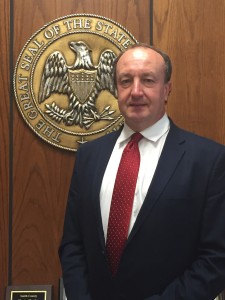Smith County Board of Supervisors

Left to right: Cindy Austin, Board Clerk; Jerry Fields, Beat One; Darron Keyes, Beat Two; Benjie Ford, Beat Three; Danny Arender, Beat Four; Howard Hammons, Beat Five; Wendell James, Board Attorney
The Smith County Board of Supervisors is responsible for the management of county government. The board has control over local taxation, budgets, borrowing, general County policy, and the adoption of local ordinances.
The Smith County Board of Supervisors is responsible for the management of county government and a number of special districts. The five supervisors are elected by district to four-year terms by the citizens of Smith County. There are no term limits. Board members serve residents in districts of different geographical sizes, but each district has approximately equal population.
The Board’s primary duties include:

- Adopting an annual budget;
- Establishing the annual property tax rate;
- Setting policies, goals, and objectives to direct the county’s growth and development;
- Adopting and providing for ordinances, rules, and regulations as necessary for the general welfare of
the county and - Carrying out other responsibilities as set forth by Mississippi state statute
At the beginning of each year, the Board chooses from its members a president and a vice president to serve during the following year. The president presides at Board meetings and signs documents in the name of the county. The vice president substitutes when the president is absent.
The Chancery Clerk of the county serves as clerk to the board and is in charge of implementing board directives. The five members of the Board of Supervisors are elected by district to four-year terms. There are no term limits. Board members serve residents in districts of different geographical sizes, but each district has approximately equal population.
The Board of Supervisors meets on the 1st and 3rd Monday of each month at 9:00 a.m. in the Board Room of the Smith County Courthouse in Raleigh. Citizens wishing to submit agenda items or speak to the board should contact the Purchasing Clerk, Heather Dolan (hdolan@smithcountyms.gov), at least one week prior to the board meeting.
All board actions, with the exception of those provided for in the Code of Mississippi, are open for public inspection. Those exceptions are most commonly personnel issues and economic development issues.
 Jerry Fields Jerry FieldsDistrict 1 Cell: 601-405-5704 Btl Brn: 601-782-9303 Office: 601-782-4000 Fax: 601-782-4002 |
 Darron Keyes Darron KeyesDistrict 2 Cell: 601-603-1338 Phone: 601-782-4000 Fax: 601-782-4002 |
 Benjie Ford Benjie FordDistrict 3 Cell: 601-670-5865 Phone: 601-782-4000 Fax: 601-782-4002 |
 Danny Arender Danny ArenderPresident District 4 Cell: 601-374-0089 Phone: 601-782-4000 Fax: 601-782-4002 |
 Howard Hammons Howard HammonsVice President District 5 Cell: 601-507-6140 Phone: 601-782-4000 Fax: 601-782-4002 |
 Heather Dolan Heather DolanPurchase Agent Phone: 601-782-4000 Fax: 601-782-4002 |
CONTACT:
Board of Supervisors
P O Box 160
Raleigh, MS 39153
BOS Office Phone Number: 601 782-4000
Fax: 601 782-4002

Wendell James
Phone: 601-764-7640
County Board Attorney
With the complexity of today’s county government, the board attorney is a critical appointment for the board of supervisors. It is essential that the board attorney provide sound legal advice to the board of supervisors in all matters concerning the county and county operations. It is also critical for the board of supervisors to follow the advice given by the board attorney. Since a wide variety of legal issues surround the normal activity of county government, the board attorney gives advice to assist in keeping the board of supervisors within the confines of the law when the board makes decisions.The board attorney’s duties consist of a wide range of activities including:
- Attending meetings of the board of supervisors;
- Drafting minutes;
- Represent the board of supervisors in:
- All civil cases of county interest
- Eminent domain proceedings
- The examination and certification of title to property the county may be acquiring
- Any criminal suit against a county officer for malfeasance, where the county may be financially liable.
- Answering legal inquiries from board members, other county officials, and citizens;
- Researching land records;
- Drafting board orders;
- Obtaining Attorney General’s opinions;
- Acquisition of road and bridge right of ways;
- Voting rights submissions;
- Reviewing and drafting of contracts
- Drafting local and private legislation
- Bond work, and
- An array of litigation
